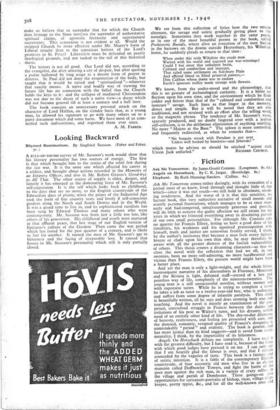Looking Backward
Rhymed Ruminations. By Siegfried Sassoon. (Faber and Faber. 5s. ) A RULE-OF-THUMB survey of Mr. Sassoon's work would show that his literary personality has two sources of energy. The first is that which brought him to the notice of the rebel few during the last war. It is the same one which affected his career as a soldier, and brought about actions recorded in the Memoirs of an Infantry Officer, and also in Mr. Robert Graves's Good-bye to All That. The other source of supply is older, deeper, and latterly it has emerged as the dominating force of Mr. Sassoon's self-expression. It is the self which looks back to childhood, to the days that are no more, to the English countryside of the Edwardian days of plenty, when the prizes of the Industrial Age took the form of fine country 'seats and lovely if self-conscious gardens along the North and South Downs and in the Weald. It was a grand time to live in, and its sophisticated ruralism has been sung by Edward Thomas and many others who were contemporary. Mr. Sassoon was born just a little too late, like others of his generation. His childhood and youth were nurtured in that affluent peace, that last stage of our English version of Epicurus's culture of the Garden: Then came the war period which has lasted for the past quarter of a century, and is likely to last for another: It turned the men of Mr. Sassoon's age to bitterness and the facing of irreparable loss. It caused that fissure in Mr. Sassoon's personality which still is only partially closed.
We see from this collection of lyrics how the two 'strains alternate, the savage and satiric gradually giving place to the nostalgic. Sometimes they work together in the same poem, as in one of the most beautiful poems in the book, called Prehistoric Burials, where after an evocation of the men buried in the barrows on the downs outside Heytesbury, his Wiltshire home, he suddenly pleads to return to that time : When under this wide Wiltshire sky crude man Warred. with his world and augured our war-winnings!
Could I but enter that unholoen brain, C,abined and comfortless and insecure, That ruled some settlement on Salisbury Plain
And offered blood to blind primeval powers,—
Dim Caliban whose doom was to endure Earth's ignorant nullity made strange with flowers.
We know, from the under-mood and the phraseology, that this is no gesture of archaeological curiosity. It is a bitter re:. flection upon his own time, and the environment which he finds colder and fiercer than that of the " cabined and comfortless and insecure" savage. Such lines as that linger in the memory, direct and simple. But it will be noted that they are also traditional, and not strained with an effort after the telling word, or the magnetic phrase. The tendency of Mr. Sassoon's verse, sparsely produced, and no doubt lingered over with a jealous self-criticism is to the deliberate elimination of anything startling. No more " Majors at the Base." The spleen is more controlled, and frequently redirected, as when he remarks that- " No bargain struck with Potsdam is put over Unless well backed by bombers—and Jehovah!"
which motto he advises us should be stitched "across each


























 Previous page
Previous page